Computers are used these days to detect your interests and feelings. On my 'Recommended reading' list in my Amazon account, I came across a book called The Group
This book is set in a time period that most people reading this post would not recall well, although it was written in the 1960s when women's liberation and sexual freedom was at the fore, and remained at the top of the bestseller list for two years. I'm glad I took up Amazon's recommendation when I ordered the book. After reading it, I realised that it is a book which every modern woman should read. It offers a witty, satirical, often comic description of the female role in society, which has changed very little over time, despite the fact that society and technology have progressed immensely since it was written.
The book has its inherent difficulties: There were too many main characters to remember from one reading period to the other, both the sentences and paragraphs were exhaustingly long, and the detailed political events described in it seem to bear little significance in our own time. But every woman will relate to at least one of those eight women, who all have a flawed personality, as Candace Bushnell states, in the introduction to the latest edition. Many of the characters of my own stories are also flawed; it's easy to love them or hate them, but the truth is that we all have our flaws, because none of us are perfect, are we?
The Group
The book reminded me of a few moments in my life when I felt my femininity was being severely challenged. These incidents show a comic side to my dual identity. How one culture views a woman's role often differs radically from the way another culture will view it, and we all probably have instances from our travels when we have felt these clashes. For me, the stark contrast was made explicit on my return trip to New Zealand seven years ago. My father had died only a few months before, I was a mother of very young children (they were both under three), and many of my mainly Greek New Zealand friends and relatives were meeting my Greek (and very Cretan) husband for the first time. Their memory of myself had stayed at the early 1990s version of what I used to be: a young single well-educated Greek woman, a recent university graduate with a high profile in the GOCW.
On the first day of my arrival back home (which is of course a misnomer, for anyone that knows me well, which I believe my readers do), a number of my mother's Greek friends, immigrants to New Zealand like herself, now grandmothers (a fortune that my late mother did not share), came to see me at my loving aunt's house, where I would stay throughout my two-month visit to the 'home' country. Despina* was accompanied by her married daughter, Lina, who ferried her everywhere, because Despina had never learnt to drive, just like all those friends of my mother's, but completely unlike my own mother, who had learnt to drive. I remember Lina as a teenager - she was only a couple of years younger than myself; whose limited interests never endeared her to me, even while we attended the same schools, after which point our lives vastly diverged, and I lost touch (willingly) with her, until this moment of my seeing her for the first time again after many years, as a married woman with a young son. After the routine greetings and introductions, Despina asked me about my life now that I was married and had children. Because I have known Despina all my life, I knew she was not being catty or nosy - her whole life had revolved around ordinariness, with her daily routine changing as much as her age and the passing of time. She had accepted her fate as if it were the same one everyone was destined to go through: birth, childhood, maturity, marriage, childbirth, child rearing, becoming a grandparent, death (she had passed all the stages except the final one). She was just asking these seemingly personal questions because she knew very little else to ask or talk about.
"Does your husband help you around the home, Maria?" she shot blankly at one point. These kinds of questions are common among Despina's παρέα; they fit into the same paradigm as questions about how much money you make in your job, if you own your own home, and what side of the bed you sleep on. They're not just for 'small talk' purposes; they are the only talk that people like Despina make. "Lina's husband helps her a lot,' she continued, "doesn't he, Lina?" she said, turning to her daughter, who was one of those girls who had nearly always lived at home, even when she got married; what started out as a decision based on financial reasons had become a habit for the sake of convenience.
I was a little taken aback by this question, because I know that Despina's husband (a demure man in nature, shorter than his wife, who never raised his voice) never helped her around the home, not because he was some kind of oaf, but simply because that's the way Despina and her husband had been accustomed to living; the roles of man and woman were clearly differentiated into their traditional Greek ones. I immediately put myself on the alert - my working mother role had never really been challenged all the while that I had been living in Greece, so why was this woman interested in whether my husband donned on an apron?
"My husband and I have shared the house duties," said Lina proudly. "We don't live like Mum and Dad did in the past, like your parents, Maria," she reminded me. "When we both come home from work, I lay the table and serve the meal, and when we finish eating, my husband does the dishes."
"Don't you have a dishwasher?" I enquired innocently; I thought Greece was behind the times, not the New Zealand that had at the time of my visit been revelling in its Lord-of-the-Rings fame.
"Oh, we're going to get one installed when we move into our own home, but I don't think that's going to happen soon," Lina replied, chuckling, as if to show that she had already thought of the idea that her husband's duties might become obsolete due to technology, and she'd have to reassign his household chores, lest he became redundant.
"What kinds of meals do you cook?" I asked, again innocently. Till that moment of my return to New Zealand, I thought all modern women did everything themselves (just like I did) and hired paid help when they couldn't manage (just like I did). In fact, I was very interested to hear about what Lina cooked, because I was hoping she might share a tasty easy-to-cook recipe that my husband might also like, which might simplify my workload from the usual slow-cook traditional Greek food that my husband insisted on eating (up until the time he visited another continent, that is).
At this point, Lina's face soured a little. She turned to her mother, who caught on to her tension. They both laughed, admitting that Despina cooks all the meals in the house, while Lina will make a sweet every now and then. In retrospect, I wondered if Lina would have admitted to me that she did not cook the main meals at home, had her mother not been present at that moment. Lina forgot to mention that she did not cook family meals, because - I suppose - her mother took it for granted that she would continue to do this for all five members of her present household (Despina, her husband, Lina, her Greek-Kiwi husband, and their primary school son - Despina's other daughter had become a famous model and was now across the ditch).
"You probably don't do much cooking now with the children, do you Maria?" Despina asked me, looking at my very demanding children, who were fighting over the one toy that my aunt had found in the house, a remnant of her own children's toy collection; she herself was about to become a grandmother for the first time in a few months.
"Are they always this loud?" Despina asked me, almost simultaneously. I thought all kids were loud at this growth stage; maybe Despina's noise tolerance was limited because Despina wasn't used to having more than one child in the same house at the same time (except when she was raising her own two children, which, of course, was almost a zillion years ago in her mind).
I returned to Lina's question, describing the meals that I cooked at home, which were pretty much the same kinds of meals that my mother cooked in New Zealand, good solid Greek food which the whole family would be able to enjoy. I was just about to tell her how much I regretted that my children were not being introduced to a variety of international tastes and flavours like I was when I was growing up in New Zealand, when Despina interrupted me with a question.
"But doesn't your mother-in-law live in the same house as you?" she asked me.
"Not in the same house," I replied. I knew what she was getting at. Many Greek women rely on their mothers/mothers-in-law to cook for them. This has very little to do with the family-centred image that is often assumed of Greek people; to have someone cooking a meal for you while you are away from home is simply a modern day convenience, popularised from the time when women entered the workforce en masse in the 1980s with low salaries. Greek women were generally homemakers before that time, so it's highly unlikely that they would have needed someone to cook for them once they set up their own home. Families often live close to each other, even in urban centres, so it seemed convenient for one woman to cook while the other was out. The truth is that the women cooking for others are now demanding their own freedom away from this constraint, but it's very hard to teach old dogs new tricks, especially when the master let it play old ones for a long time. They now realise that they have been playing the drudge while others are liberated from their own responsibilities. It's also a question of give and take: can the 'takers' also become the 'givers' when their turn comes round?**
"She lives in the apartment downstairs," I explained, "but her house is separate from ours."
"Yes, but doesn't she cook a meal for you when you're at work?" Lina asked as she looked at me incredulously. In deference to her mother's age and status, I put some water in my wine; instead of telling her that, yes, I do cook all my family's meals, and no, I don't think it's wrong of my husband not to help me in the kitchen (the equality of the sexes in Crete has less to do with the sharing of household duties, and more to do with the understanding that one partner has for the other), I hedged my bets a little.
When Yiayia cooks something special, she always shares it with us. She still cooks now, even at nearly 87 years of age. I have helped to immortalise her cooking with my photos; the first Google image of youvarlakia (right) that you see is hers. (Interestingly enough, it is the only one made with red sauce - all the other photos of youvarlakia use white sauce). Yiayia also cooks old-fashioned, almost forgotten traditional Cretan food, teaching me special recipes that I'd otherwise not have access to.
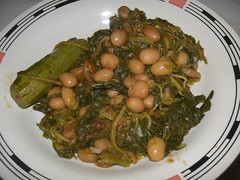



"Well, my mother-in-law cooks all her own meals, and when she cooks something special, she always shares it with us." I paused for a spontaneous moment, thinking about how we share food in our own home. It is a question of give and take: whoever is doing the cooking never does it specifically with their own self in mind. I turned my face specifically towards Lina. "You know something," I began, with a smile on my face, to tone down the weight of my next statement, "I feel a bit embarrassed asking her to cook a whole meal for my family; after all, she's 80 years old, and I just don't feel it's right for me to ask her to take on these duties, because she might feel it to be an imposition, and at her age, I can't blame her."
Despina had taken early retirement (just when her daughter moved back into her parents' house), and she looked considerably youthful. She had been born in a Cretan village, and had picked olives for a living before migrating to the New World on the same journey that my mother took. They had been companions since arriving in New Zealand, where their first job was as cleaning ladies at a boarding school in the countryside before they both moved down to the capital. Despina had never worked again in the fields. She was also was much younger than my mother, but unlike my mother, Despina had never run her own business, and most importantly, she had always enjoyed full health. Often when I look at my mother-in-law, despite our mutual differences, I see in her the mother that I might still have had, had things turned out differently, an overworked woman who might have been hoping to find a bit of peace and quiet in her retirement, which she never saw, surrounded by her children.
"Yes, yes," sighed Despina, suddenly showing her age. "You were always a good girl to your mama, Maria." I fought back the tears; Despina remembers my mother's last few years as a very sick woman. She began to view my predicament more sympathetically. Not so Lina.
Mr Organically cooked, giving a helping hand in the kitchen; here he is mixing kalitsounia filling.
"But if you're doing all the cooking," she said in a heavy Kiwi twang, "can't your husband help you with the cleaning at least? I work just as many hours as Peter, and it's not fair for me to do everything alone at home and look after our son." I was just about to agree with her that, indeed, marriage is a partnership and both parties should do their fair share to make it succeed when Lina revealed another astonishing feat accomplished by her husband.
"When our son was born," she began her narrative with a firm tone of voice, "I stayed home and looked after him but PE-ter went to work, and EV-ree DAY, I was left a-LONE at home with a FU-ssy BA-by..." She enunciated each syllable as if it were a separate word. "... which meant he couldn't bond PROP-ly with the baby coz he was out of the house all the time. So I used to express a bottle of milk a day so that HE could feed the BA-by when it woke up in the middle of the night, and I could get some rest." I began to feel sorry for Peter. He was beginning to sound like a variety of Cretan cheese that was probably being made at the Archakis dairy station.
But I also had to feel sorry for poor Lina. Or should I say rich Lina? She had no idea what it was like living, working and being married in Crete, even though both her parents were from the island. Admittedly it had been a while since she and her mother had last visited the island. Lina and her husband both worked office-hour jobs in a New World capital city, they both went to work and came home at the same time, they both had their weekends free, and when they arrived back home at the end of a busy day at work, they would always find a freshly cooked meal on the table, a clean house, and more importantly, a ready-to-be-tucked-into-bed child that the grandparents were looking after during the day, picking him up after school, feeding him and keeping him entertained until his parents took over later in the day.
"How do you cope with all that work, Maria?" Lina asked my wide-eyed self, clearly irritated that I hadn't supported the classic feminist image that I had grown up with in New Zealand, the one that was instilled in both of us outside the home. "It must terrible if your husband doesn't help you out," she added, just to rub it in.
"Hey, I just hire a cleaner if it all gets on top of me!" I replied spontaneously, feeling equally vexed by her assumptions.
Lina looked very pleased with my answer. "Oh, you're so lucky to be able to afford one! You must be doing well!" It relieved her to hear that I wasn't perfect, which no one is, anyway.
I have to forgive Lina for her naivety, because she doesn't know a lot of things. She didn't know (nor did she ask to find out) that when my husband comes home from work (where he sits on his bum all day in a taxi, rain or shine), it may be in the middle of the night, in the early hours of the morning, or in the hottest hour of the day at noon. She didn't know that he may work 10-12 hours at a stretch, and that he often does two jobs in one day. When he puts on his farmer's clothes, he drives out to his ancestral fields to see: if the trees need to be irrigated or if they need to be trimmed of unnecessary branches; if the fruit is ready for harvesting of the fruits (oranges in the summer, olives in the winter); if the ground needs to be cleared of weeds or firewood. Throughout these tasks, his family might also accompany him when time permits, not to perform any of the laborious tasks, but simply to provide some moral support. I wonder if Lina's husband likes gardening; Lina's father is probably taking care of that, too.
Sometimes, it's very hard to convince the children to come to the fields with us, because we usually go on the weekend when they want to watch cartoons. Once there, however, they forget about the cartoons and have an enjoyable carefree runaround.
I knew it was pointless to explain all this to Lina, because Lina was a little bit thick; there's only so much that a pea-sized brain can imbibe. She was the next generation in that small group of well-meaning but tiresome friends of my parents who did not thrive under intellectually stimulating conditions. It would be too much of a challenge to get her to talk about some things that were on my mind while we were sitting together in my aunt's living room. For instance, I was curious to know how enjoyable her sex life was these days. She had moved back into the family home just after she got pregnant and was now sleeping in her parents' former bedroom, while her parents had moved into one of their children's former bedrooms (next door to Lina's present bedroom). I might pluck up the courage to ask her about this the next time I visit New Zealand.
Έρωτας: Romeo and Juliet α λα Ελληνικά. Skip to 9:45 to watch him paying for it.
*** *** ***
Sex plays an important role in The Group"... Kay was glad when Harald tooled home (that was one of his favorite expressions) for dinner, instead of eating with the others in that speak-easy. Once he had brought one of the authors, and Kay had made salmon loaf with cream pickle sauce. That would have to be the night they broke for dinner early, and there was quite a wait ('Bake 1 hour', the recipe went, and Kay usually added fifteen minutes to what the cookbook said), which they had to gloss over with cocktails. Harald did not realize what a rush it was for her, every day now, coming home from work at Mr Macy's and having to stop at Gristede's for the groceries; Harald never had time any more to do the marketing in the morning. And, strange to say, ever since she had started doing it, it had been a bone of contention between them. He liked the A&P because it was cheaper, and she liked Gristede's because they delivered and had fancy vegetables - the Sutton Place trade, Harald called it. Then Harald liked to cook the same old stand-bys (like his spaghetti with dried mushrooms and tomato paste), and she liked to read the cookbook and the food columns and always be trying recipes with her glasses on and measuring the seasonings and timing everything; cooking was a lively art and she made it academic and lifeless. It was funny, the little differences that had developed between them, in the course of three months; at first, she had just been Harald's echo. But now, if he said why not be sensible and open a can (this was another night when dinner was not ready), she would scream that she could not do that, it might be all right for him, but she could not live that way, week in, week out, eating like an animal, just to keep alive. Afterward, when he had left, she was sorry, and made a resolution to be a better planner and budget her preparation time, the way the food columns said. But when she did manage to have dinner waiting in the oven, having fixed a casserole the night before, he would get irritated if she tried to hurry him to the table by reminding him what time it was. 'Less wifely concern, please,' he would say, waving his forefinger at her in the owly way he had, and deliberately shake up another cocktail before he would consent to eat."
Harald was a lover of convenience foods and set meals, not the fancy creative stuff that the modern woman of the time was discovering. He wanted Kay to learn how to cook like him, but she had different ideas. Mary McCarthy cleverly includes whole recipes written in prose style (measurements excluded) that give us a taste of what an American meal might have been like in the 1930s:
"... Harald was teaching her to cook. His specialties were Italian spaghetti, which any beginner could learn, and those minced sea clams - terribly good - they had the other night, and meat balls cooked in salt in a hot skillet (no fat), and a quick-and-easy meat loaf his mother had taught him: one part beef, one part pork, one part veal; add sliced onions, pour over it a can of Campbell's tomato soup and bake in the oven. Then there was his chile con carne, made with canned kidney beans and tomato soup again and onions and half a pound of hamburger; you served it over rice, and it stretched for six people. That was his mother's too. Kay, not to be outdone - she said, laughing - had written her mother for some of the family recipes, the cheaper ones: veal kidneys done with cooking sherry and mushrooms, and a marvellous jellied salad called Green Goddess, made with lime gelatin, shrimps, mayonnaise, and alligator pear, which could be fixed the night before in ramekins and then unmolded on lettuce cups. Kay had found a new cookbook that had a whole section on casserole dishes and another on foreign recipes - so much more adventurous than Fannie Farmer and that old Boston Cooking School. On Sundays, they planned to entertain, either at a late breakfast of chipped beef or corned-beef hash or at a casserole supper. The trouble with American cooking, Harald said, was the dearth of imagination in it and the terrible fear of innards and garlic. He put garlic in everything and was accounted quite a cook. What made a dish, Kay said, was the seasonings. 'Listen to how Harald fixes a chipped beef. He puts in mustard and Worcestershire sauce and grated cheese - is that right? - and green pepper and an egg; you'd never think it bore any relation to that old milky chipped beef we got at college.'"Harald sounds like a meat-and-tomato-sauce kind of man, the kind I know well. But he also likes to cook. We understand him to be a rather miserly person, but his recipes, occasionally sounding rather sublime, reflect good home economics:
"'How lucky you are, Kay,' Dottie said warmly, 'to have found a husband who's interested in cooking and who's not afraid of experiment. Most men, you know, have awfully set tastes. Like Daddy, who won't hear of 'made' dishes, except the good old beans on Saturday.' There was a twinkle in her eye, but she really did mean it that Kay was awfully lucky. Kay leaned forward. 'You ought to get your cook to try the new way of fixing canned beans. You just add catsup and mustard and Worcestershire sauce and sprinkle them with plenty of brown sugar, cover them with bacon, and put them in the oven in a Pyrex dish.' 'It sounds terribly good,' said Dottie, 'but Daddy would die.' Harald nodded. He began to talk, very learnedly, about the prejudice that existed in conservative circles against canned goods; it went back, he said, to an old fear of poisoning that derived from home canning, where spoilage was common. Modern machinery and factory processes, of course, had eliminated all danger of bacteria, and yet the prejudice lingered, which was a pity since many canned products, like vegetables packed at their peak and some of the Campbell soups, were better than anything the home cook could achieve. 'Have you tasted the new Corn Niblets?' asked Kay. Dottie shook her head. 'You ought to tell your mother about them. It's the whole-kernel corn. Delicious. Almost like corn on the cob. Harald discovered them.'"Lina would have been enamoured by Harald's domesticity, don't you think? Maybe her marriage might take a similar turn to Kay and Harald's (you can read the book to find that one out). For those like Kay still prejudiced against canned convenience foods, there were also new discoveries to be made in the 1930s in terms of fresh food, which traditional people were also against because they sounded too new-fangled, and went against what they already knew and trusted:
"'Does your mother know about iceberg lettuce? It's a new variety, very crisp, with wonderful keeping powers. After you've tried it, you'll never want to see the old Boston lettuce again. Simpson lettuce, they call it,' Dottie sighed. Did Kay realize, she wondered, that she had just passed the death sentence on Boston lettuce, Boston baked beans, and the Boston School Cookbook?"I've always found it difficult to prepare the family meal for my family, even when I wasn't working so many hours. The problem is to prepare something that everyone wants to eat, and to make it tasty even when it may be cooked from the night before. One-pot saucy meals do well in this respect. As the children keep growing, leftovers are also harder to come by, which means a lot more food is needed! All this has meant a sudden replanning of my weekly cooking schedule; I say 'sudden' because my landing a full-time job came about when the colleague I shared office duties with suddenly absconded.
Our travels have helped shape our breakfasts. Every morning, we eat breakfast as if we were on holiday...
Our breakfasts are standard affairs, usually requiring a number of store-bought convenience foods that are cooked/prepared very quickly, eg coffee, milk, semi-sweet biscuits and toast. They don't require any special cooking time or technique. This meal never varies except at weekends when the children treat themselves to cocopops. In the afternoon, I always present the fruit bowl to the children at the table while they're doing homework. A friend recently admired it, saying it looked very attractive, almost tempting him into wanting to eat fruit. It generally works.
Fast food or convenience food is not the same around the world - each culture has its own specialties. In Greece, a cheese pie (left) is a popular fast food, while in Crete, if someone doesn't have time to make their own kalitsounia (a local pasty specialty), they can buy them ready to cook from the supermarket (right).
Our evening snack usually consists of some kind of more carbohydrates, which may involve store-bought convenience food or my own 'fast foods' (items prepared from fresh ingredients that I've prepared in bulk and frozen): pancakes, dakos, kalitsounia, pizza or a pie . Then there are the children's school lunches to prepare, which again involve some standard meals: I like to choose among five different meals, namely potato salad, pasta salad, a rice dish, a piece of pie, or a sandwich. Again, these can all be prepared even when my mind is working on automaton.
School lunches and main meals are often made from home-made 'fast food' in our house - I keep a lot of homemade foods in the freezer (in the cooking vessel I will use to cook them in when I choose to use them up) that don't require great effort to prepare on the day I need them.
The most important meal of the day in Greece is the one we still refer to as the midday meal, even though the current working hours of the average Greek mean working until well into the afternoon. That's the meal that I have to prepare for the next day - variety, taste, flavour and each family member's idiosyncrasies have to be taken into account. Convenience foods do not usually work here; my husband has similar ideas to Kay concerning the use of canned food or ready store-bought meals as a main meal. Thank goodness for the deep freeze and the hard work I put into preparing food from our summer garden, ready for immediate cooking. I generally stick to a regular weekly schedule, but life isn't perfect, so it's reassuring to know that supermarkets and souvlaki shops are open most hours in the day!
I can't go hungry at work - breakfast, lunch and dessert are served every day!
Here's the funny part of my meal planning. I always taste the food I cook for my family, whether it's when I'm cooking it, or I'm cooking the next day's meal. I don't actually eat a whole plate of my nourishing food, because I'm not always at home when everyone else is having lunch. But every day, I always eat a well-cooked Cretan lunch, even though I am not actually the one that cooks it; my work provides this for me free of charge, cooked by one of the best chefs on the island. Since I know I have this luxury at my disposal, it spurs me on to provide a decent meal for my family. Thank goodness for weekends. Christmas is around the corner too. I'm starting to count down the days until my annual leave...
*** *** ***
Finally, I present to you a recipe that Harald would have been pleased to have his wife make. Here's my favorite quick'n'easy convenience food meal that my kids, but not my husband. Apart from the fact that it tastes rather bland compared to what he is used to eating, it also contains an ingredient which, in Crete, is known as 'chicken feed': corn is eaten roasted or boiled on the cob, but it rarely makes its way into any other traditional food on the island.
For 2 servings of quick'n'easy corn and tuna pasta, you need:
a small can of corn niblets, drained of the liquid (Green Giant is also sold in Greece)
a small can of tuna, drained of the liquid (unless you use tuna with oil added - in that case you won't need to use the extra oil mentioned below)
a small onion, minced
a fat clove of garlic, minced
some olive oil (Harald might have gone without, or used lard or butter instead)
salt and pepper (ground and ready to use; Harald probably didn't bother with mills)
150g of spaghetti or macaroni (the choice of pasta shapes available in our time is wider than in Harald's time)
a few sprigs of parsley or rocket, shopped finely (Harald probably wouldn't've bothered with, as it is mainly for garnish; I add it especially for my son who has recently taken a liking to this kind of use of green things in pasta)
grated cheese (the kids like to add this, but I think fishy pasta sauce doesn't really need it)
Boil the pasta. While it is cooking, place the oil in a small saucepan and add the onion, garlic, tuna and corn. Season with salt and pepper. Let the ingredients blend together over low heat for about 10 minutes. Both pots will be ready at the same time. Drain the pasta, add the parsley or arugula garnish to the pasta (it sticks to it more easily while it is hot), and pour the tuna sauce over it. Sprinkle some grated cheese over the pasta, if desired. This dish can be served hot or cold.
For 2 servings of quick'n'easy corn and tuna pasta, you need:
a small can of corn niblets, drained of the liquid (Green Giant is also sold in Greece)
a small can of tuna, drained of the liquid (unless you use tuna with oil added - in that case you won't need to use the extra oil mentioned below)
a small onion, minced
a fat clove of garlic, minced
some olive oil (Harald might have gone without, or used lard or butter instead)
salt and pepper (ground and ready to use; Harald probably didn't bother with mills)
150g of spaghetti or macaroni (the choice of pasta shapes available in our time is wider than in Harald's time)
a few sprigs of parsley or rocket, shopped finely (Harald probably wouldn't've bothered with, as it is mainly for garnish; I add it especially for my son who has recently taken a liking to this kind of use of green things in pasta)
grated cheese (the kids like to add this, but I think fishy pasta sauce doesn't really need it)
Boil the pasta. While it is cooking, place the oil in a small saucepan and add the onion, garlic, tuna and corn. Season with salt and pepper. Let the ingredients blend together over low heat for about 10 minutes. Both pots will be ready at the same time. Drain the pasta, add the parsley or arugula garnish to the pasta (it sticks to it more easily while it is hot), and pour the tuna sauce over it. Sprinkle some grated cheese over the pasta, if desired. This dish can be served hot or cold.
*We all know the rules of the game - all names and details changed, but the facts remain.
** This question can also be viewed within the context of the present economic crisis; Greek people's lives have been based on infeasibility to the maximum extent.
©All Rights Reserved/Organically cooked. No part of this blog may be reproduced and/or copied by any means without prior consent from Maria Verivaki.
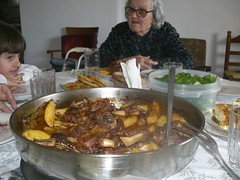
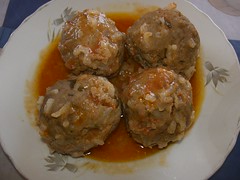
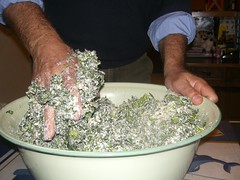
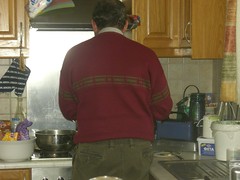



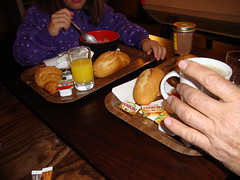
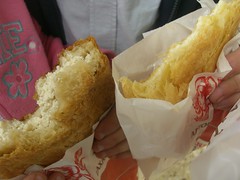
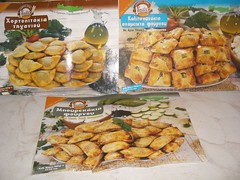

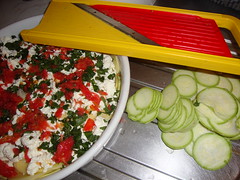


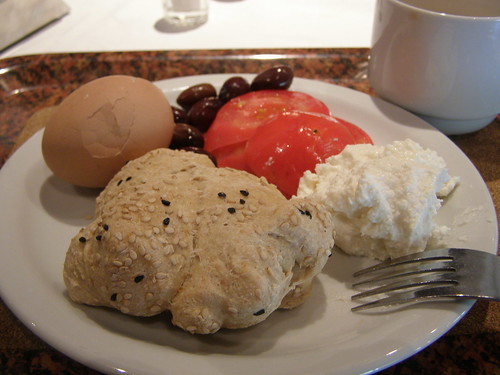
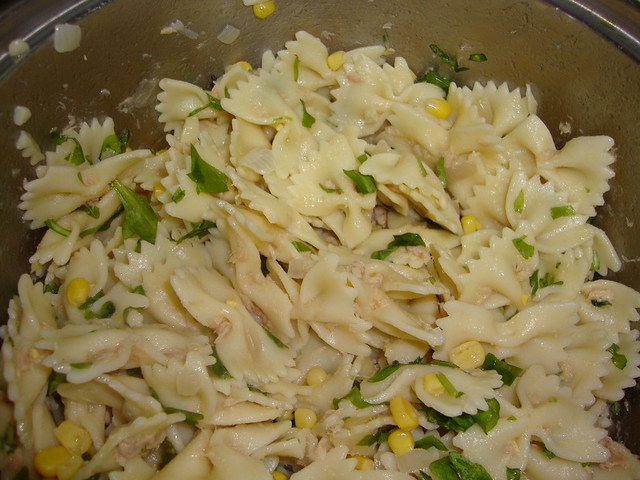
LOL Maria:)
ReplyDeleteHave a great week!
Hmmmm... I think that it would be very hard to be the sole provider of homecooked meals day in and day out for years and years.It sounds like you are very organized and have good ideas for meal planning. It is interesting to hear about that very big and important job that mostly women have all around the world. I have always said that it would be a real luxury to come home to dinner ready and waiting. Right now I do have that privilege because my husband is having 4 months of "early retirement." Meaning that he is not actually retired but was asked to take "early retirement." (as in "you better take what we're offering you because we may have to lay you off later package") Fortunately, he has a new job starting in January. So, he cooks dinner every day and I am loving it! He always has liked to cook. I have been known to say to young women contemplating marriage, "if he cooks for you then he is a kind person and will be a good husband." But...old social rules dominate in most societies and men have not been the main cooks for thousands of years.
ReplyDeleteI think we Moms should teach our boys as well as our girls to cook. My two boys (who are men now) can cook and enjoy it.
I am going to look for that book at my library. It sounds familiar. I think a movie may have been made of it sometime in the past.
everybody shoud know how to cook, boys included, there is no excuse these days!
ReplyDelete